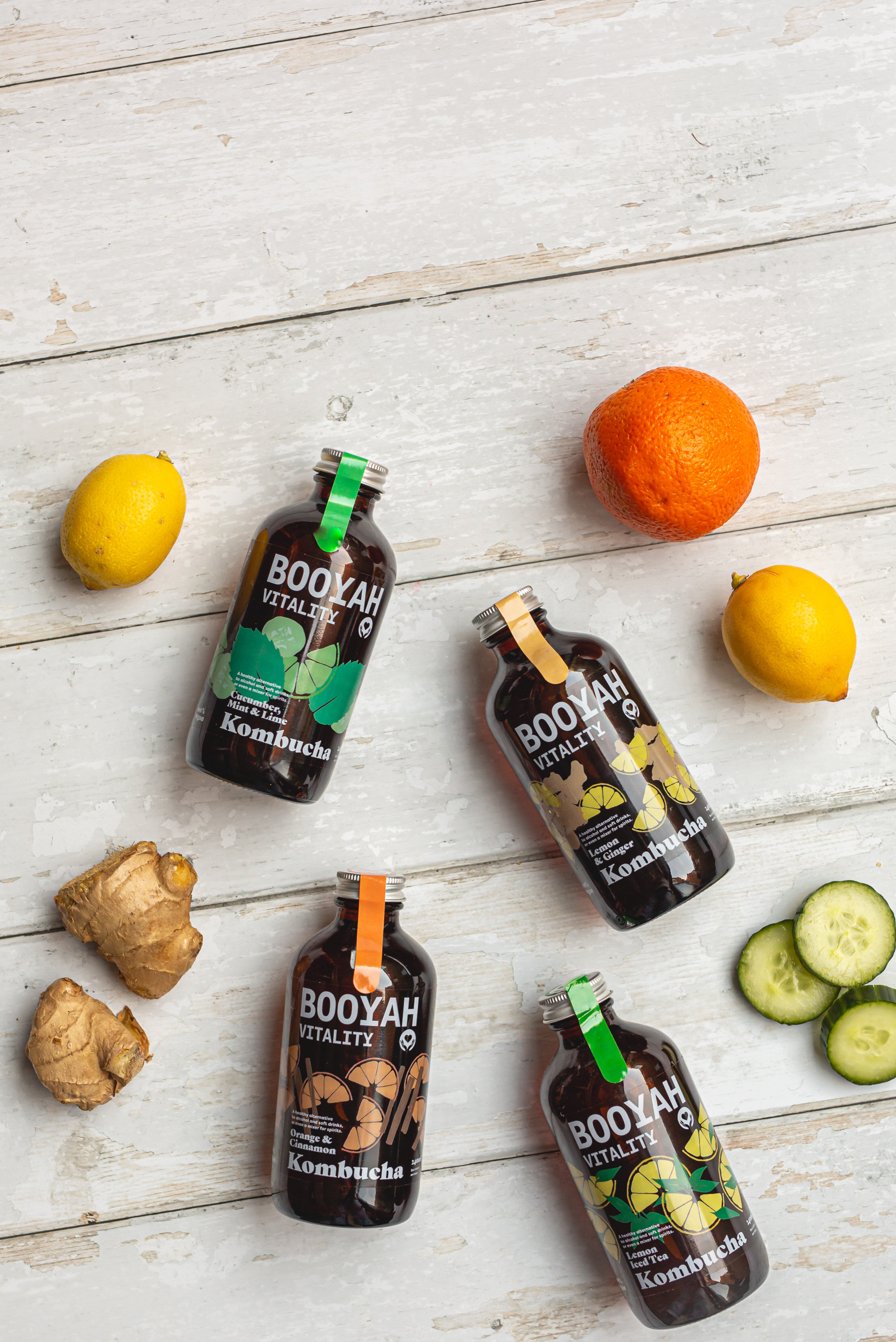Have you ever wondered why we sell our Kombucha in dark glass bottles?
What is Kombucha?
If you haven’t tried our amazing kombucha drinks, you’re in for a treat.
Kombucha is fizzy drink made from sweet tea, although it doesn’t taste like tea. Our kombucha is made from either organic green tea or black tea, depending on the flavour: lemon and ginger, lemon iced tea, orange and cinnamon, and cucumber, mint and lime.
It’s not a new drink- the health benefits of Kombucha have made it a popular drink in China, Japan, and Russia for nearly 2000 years!
As with all our drinks at Booyah Vitality, our kombucha is chock full of vitamins, minerals, antioxidants, and probiotics. This wonder drink can boost your immune system, aid in weight loss, reduce blood pressure, combat heart disease, and even help prevent cancer!
Despite their health superpowers, the natural elements of kombucha such at probiotics are delicate. This is where our carefully chosen glass bottles come in.
Why Do We Use Dark Glass?
Probiotic bacteria (the living, good bacteria that is essential for a healthy gut) is sensitive to UV radiation, just as people are. The best preventative measure for us is to stay out of the sun, and unsurprisingly, it’s the same for probiotics.
UV light comes in three forms; UVa, UVb, and UVc.
Glass is a good filter for UVb light, the type of light that causes sunburn. This is why you don’t get sunburnt through your windows. You may not have heard of UVc light, and that’s because the natural form doesn’t make it to earth, thanks to the ozone layer. There are, however, synthetic forms of UVc light. UVa light is the type of light responsible for causing skin cancer, and the reason we’re advised to be careful in the sun.
UVa and UVc are the lights of light responsible for photochemical reactions. These reactions are what changes, and ultimately destroys, the delicate balance of vitamins and probiotics in kombucha, and other substances like medicines.
UV light penetrates the cell wall of bacteria and disrupts the molecules inside, stopping the bacteria from multiplying. This is great news for protecting us from dangerous pathogens such as salmonella, e.coli, and even covid-19. But, it’s not so great news for the healthy bacteria we’re trying to create in medicines, and probiotic drinks.
The solution? Dark glass.
For those of us that can’t remember our secondary school science lessons, here’s a recap on how light works.
Light is made up of a spectrum of colours. When we look at an item, say… a banana, we see the colour yellow because the banana reflects the yellow light and absorbs all other colours of light. A strawberry reflects red light and absorbs all the other colours.
With see-through objects, light is reflected and allowed to pass through. Clear glass reflects and lets through all colours of light. But with amber glass, yellow/orange light is reflected and allowed through the glass, while all other colours of light are absorbed- including harmful UV light.
To put it simply, dark glass bottles stop UV light from reaching the contents.
The healthy bacteria in our Kombucha are happy and protected, allowing them to go from our shop to your stomach.
Why Don’t We Put Kombucha in Cans?
Tin cans are dark. They reflect nearly all colours of light, including a lot of harmful UV light. So why don’t we use them?
Well, at Booyah Vitality, we are concerned with your health. We lovingly produce the most health-packed drinks we can, with carefully sourced ingredients. We chose glass bottles to product our drinks. But, perhaps more importantly, we chose not to use cans in order to protect you.
BPA is a chemical that was often used in the production of plastic bottles. BPA (bisphenol A) has been shown to seep into food and drink, and has harmful effects when consumed. It has been linked to
· High blood pressure
· Type 2 diabetes
· Cardiovascular disease
· Obesity
· Infertility
· Aggressiveness
· Prostate cancer
· Breast cancer
· Disrupted hormonal development
Since these discoveries, the use of BPA in plastic containers of food and drink has been heavily restricted, particularly in children’s products. Shockingly though, it is still used in the creation of epoxy linings for canned goods, such as drink cans. If it’s too dangerous to pack lunches in, then it’s too dangerous to package our kombucha in!
It is possible to get cans without BPA coating, but these come with another problem. Aluminium.
Without the coating, the aluminium is in direct contact with the food or drink, and has been shown to leech into the contents. With the acidity and carbonation of Kombucha, leeching is a real risk.
Is Aluminium Bad for My Health?
Prolonged contact with acidic food and drink allows aluminium to leech from the container into the item. In most healthy adults, approximately 95% of consumed aluminium is filtered out by your kidneys, and passes out of your system in a day. However, that still leaves 5%, in an adult who has perfectly working kidneys.
As we age, our kidneys stop being as productive. The build up of aluminium that comes with the loss of kidney function has been linked to Alzheimer’s disease, dementia and encephalopathy (brain disease).
Scientists are still arguing over how much impact aluminium can have on the human body, and how dangerous it is for our health. Some studies say there is no risk, some say there’s only a risk if you’re drinking thousands of canned drinks, and some say there is a very real risk indeed.
Frankly, at Booyah Vitality, we’re not willing to take the chance.
Glass bottles all the way!

